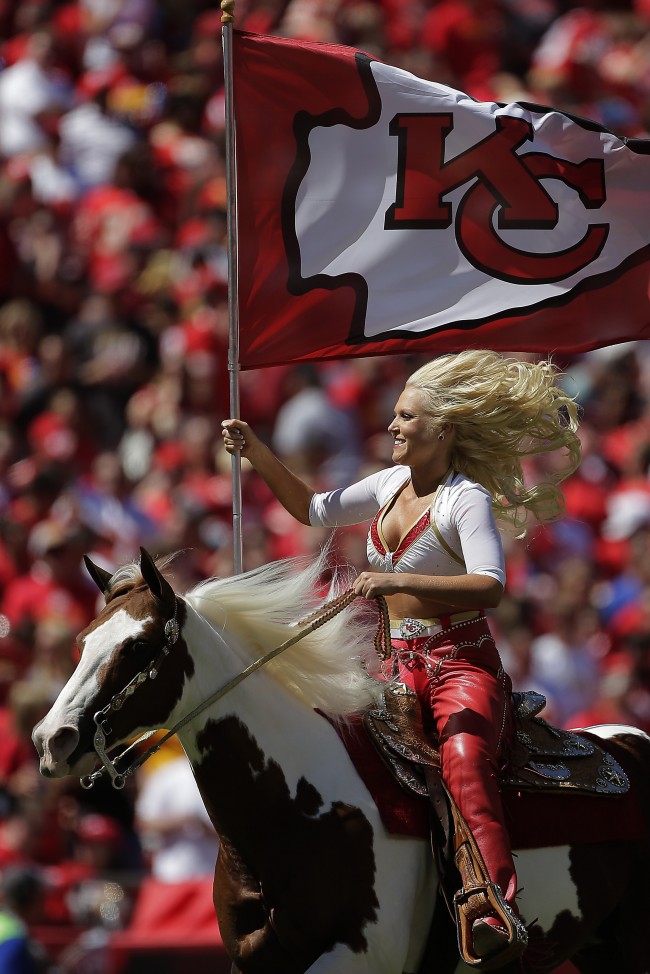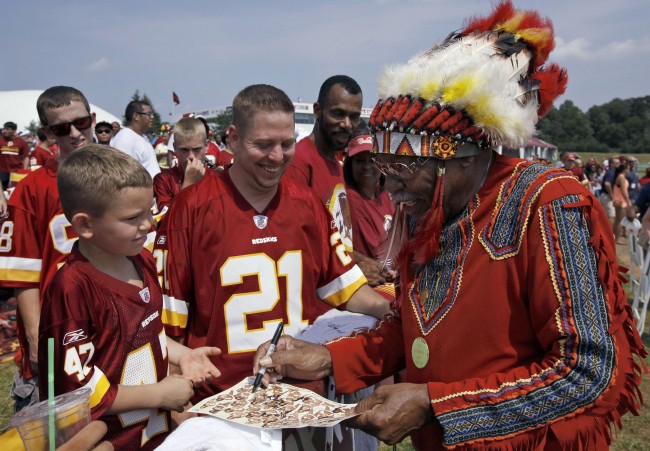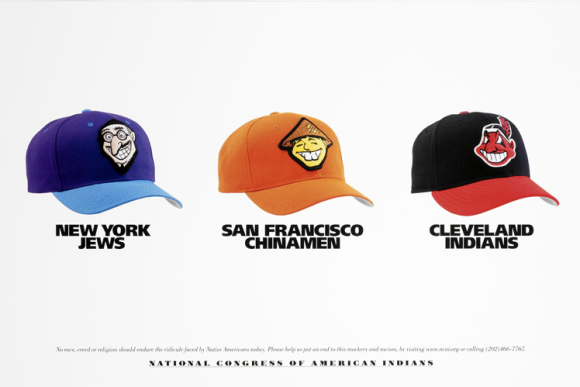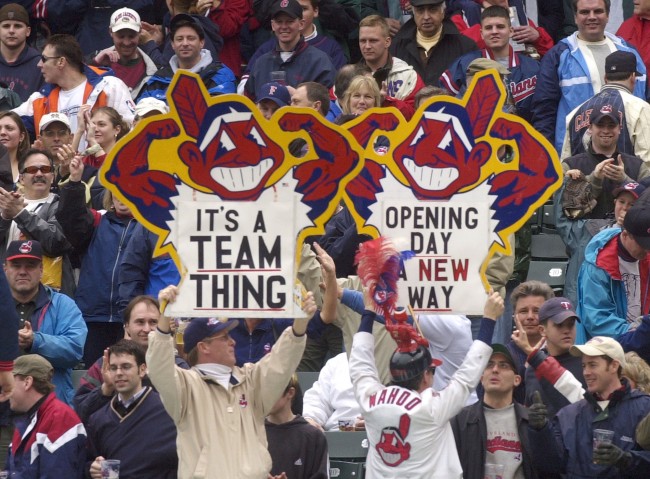Ban The Washington Redskins Name And You Label All The Team’s Fans As Bigots

Andy Blanch, wears a Native American costume and plays his drum to show support for the Redskins during Miami vs Los Angeles Super Bowl game in Los Angeles, Jan. 14, 1973. (AP Photo)
IS the term Redskins racist? During halftime of Game 2 of the National Basketball Association finals, many sports fans saw this advert. Sponsored by the Yocha Dehe Wintun Nation of Native Americans, the ad aimed to raise “an important discussion of racism.”Last week, the Trademark Trial and Appeal Board ruled that the term “Redskins” was “disparaging” to “a substantial composite” of Native Americans when trademarks were granted between 1967 and 1990. So, is the term Redskin racist? Yes. Democratic leader of the Senate, Harry Reid, wants the name changed. No says Instapundit:
“@USNewsOpinion: Why the Washington Redskins should be renamed the Federalists” “Pederasts.” W/profile of Harry Reid on helmets. — Instapundit.com (@instapundit) June 23, 2014
Reid is leading the campaign:
…50 senators, including Reid, sent a letter to NFL commissioner Roger Goodell, calling on the league to “take action to remove the racial slur from one of its marquee franchises.”
The letter ran:
In this day and age, it is imperative that you uphold your moral responsibility to disavow the usage of racial slurs. The usage of the “R-word” is especially harmful to Native American youth, tending to lower their sense of dignity and self-esteem. It also diminishes feelings of community worth among the Native American tribes and dampens the aspirations of their people. We look forward to working with you to find a solution to this important matter.
What about other names like Kansas City Chiefs, Cleveland Indians and Atlanta Braves? Mary Hudetz, of Native Peoples Magazine, says they are not derogatory but “first things first”. She says Redskins is a “racial slur”.

A Kansas City Chiefs Cheerleader rides Chiefs’ mascot Warpaint during the first half of an NFL football game against the Atlanta Falcons Sunday, Sept. 9, 2012, in Kansas City, Mo.
Many teams at college and high school levels have already changed their names, no longer featuring Native American themes. So. Why would the Redskins hang onto their Redskins name? Why should they change their name when the context is not racist? What about humour? Irony? The fans use the logo not as an expression a bigotry and hatred but of support and coming together for their team. Doug Mataconis is no fan of Reid’s strategy:
I have to wonder why this is something that Members of Congress need to be getting involved in, or why legislation is necessary to address something that is, in the end, a private business matter.
The people who don’t like the name are free to protest it. Dan Snyder and the rest of Redskins ownership are free to reject their pleas. If there ever comes a time when the public sympathizes with the protesters, then perhaps the team will feel the kind of economic pressure most likely to cause them to change positions, then we’ll likely see a name change of some kind.
Personally, I think the odds of that happening are pretty remote. The Redskins name has been in existence now since 1933 when the football version of the Boston Braves changed its name to Boston Redskins before moving to Washington, D.C. several years later. We’re not that far away from the 100th anniversary of that name. It’s going to be around for a long time to come, and I’m just fine with that.
Words can be offensive, for sure. But don’t we have the right to be offended? If you ban all words that could cause offence, when does it become censorship?

– In this Saturday, Aug. 4, 2012 file photo, Zena “Chief Z” Williams signs autographs during fan appreciation day at the Washington Redskins’ NFL football training camp at Redskins Park in Ashburn, Va. President Barack Obama says that if he owned the Washington Redskins, he would “think about changing” the team name, wading into the controversy over a football nickname that many people deem offensive to Native Americans. Obama, in an interview on Friday, Oct. 4, 2013, said team names like the Redskins offend “a sizable group of people.” He said that while fans get attached to the nicknames, nostalgia may not be a good enough reason to keep them in place. (AP Photo/Alex Brandon)
A reader writes:
As a long-suffering Cleveland Indians fan, I thought I would weigh in on this issue. I absolutely loath the “grinning Indian” that has been the team’s mascot for decades. In the club’s defense, it seems that they have been trying to limit its use despite what appears to be support for the image by fans. Today, the team uses either a script “I” or an uppercase “C” on its uniforms and caps. Eradicating the emblem altogether would be the right thing to do.
But what is not commonly known is that the team name actually came from a fan contest in the early 20th century to rename the Cleveland club. The name honors Louis Sockalexis, one of the first and only Native Americans to play major league ball. Is the term Indians anachronistic? Yes. But the name was not selected to disparage. I think that makes a difference.
 What about Redskin?
What about Redskin?
Smithsonian Institution senior linguist Ives Goddard spent seven months researching its history and concluded that “redskin” was first used by Native Americans in the 18th century to distinguish themselves from the white “other” encroaching on their lands and culture. When it first appeared as an English expression in the early 1800s, “it came in the most respectful context and at the highest level,” Goddard said in an interview. “These are white people and Indians talking together, with the white people trying to ingratiate themselves.”
Is this about the past?
…Sherman Alexie, who was born on a Native American reservation, talks about feeling “lost and insignificant inside the larger culture,” and how his culture’s “lack of power” is illustrated in stereotypical sports mascots. “At least half the country thinks the mascot issue is insignificant. But I think it’s indicative of the ways in which Indians have no cultural power. We’re still placed in the past. So we’re either in the past or we’re only viewed through casinos,” Alexie tells Bill. “I know a lot more about being white than you know about being Indian.”

In this April 8, 2002 file photo, fans hold up Chief Wahoo logo signs as they celebrate the Cleveland Indians’ opening win over the Minnesota Twins in Cleveland, Ohio. Many experts say using any human being as a mascot is demeaning regardless of the depiction, though communities at times have been reluctant to cede old traditions. The team continues to use the image of Chief Wahoo despite criticism from those who find it offensive.
So. Is the Redskins racist? Does anyone who uses the team name become a bad person? Is cheering for a Redskins a sign of your immorality? Is it a racial slur?
Posted: 23rd, June 2014 | In: Sports Comment | TrackBack | Permalink


